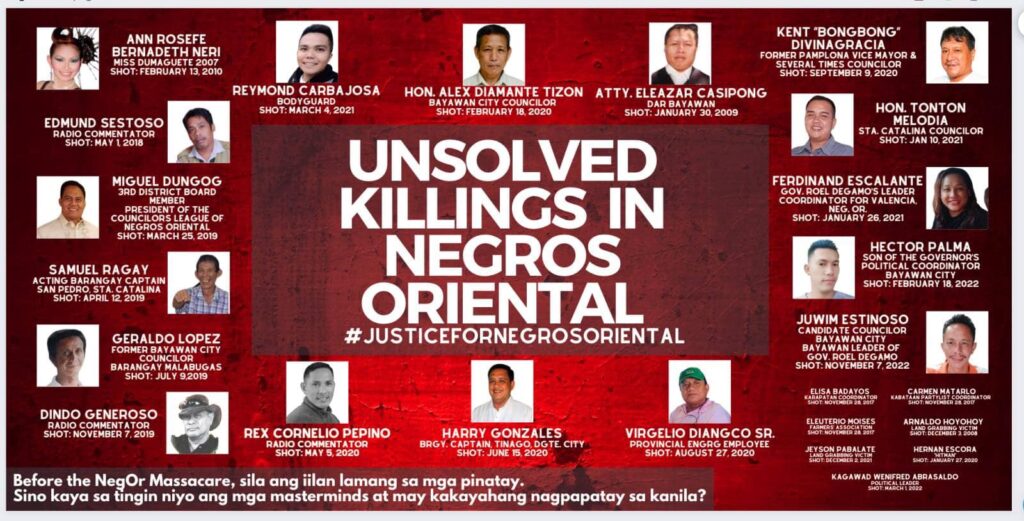Negros Oriental province is not one to feature on nationwide news often, but an event that unfolded last March 4 would firmly place the humble province in the Filipino’s psyche even during the time of writing.
As he met with destitute constituents in his hometown of Pamplona, Negros Oriental Governor Roel Degamo was brutally gunned down by assassins equipped with military-grade assault rifles. The provincial leader was killed, along with eight others, in a brazen attack now referred to as the Pamplona Massacre.
![Deceased Negros Oriental Governor Roel Degamo. [Photo: @GovDegamo Facebook page]](https://thedefiant.net/wp-content/uploads/2023/04/Photo-Gov-Roel-Degamo-FB-page-1024x683.jpg)
It is important to note that this massacre is still before an inquiry and who the masterminds are is yet to be concluded. However, suspicions were firmly placed on Degamo’s rival family – the Teves political dynasty – who have been involved in the province’s local politics for generations.
The rivalry between the Teveses and Degamo escalated last year after controversy surrounded the provincial election results between the slain governor and Henry “Pryde” Teves – a former lawmaker and member of the political dynasty.
2022 Gubernatorial Election controversy
In the race for Negros Oriental governor, a certain Ruel Degamo ran an independent campaign contesting the seat alongside Teves and the incumbent Governor Roel Degamo. Suspicions were raised about Ruel Degamo’s candidacy: he had a near-identical name to the sitting governor, he had no profile to stand on thus was a complete outsider to win the race, and also that ‘Degamo’ isn’t even his real surname, but rather Gaudia.
![Congressman Arnie Teves, one of the suspected masterminds of the Pamplona Massacre. [Photo: @ArnieTevesOfficial Facebook page]](https://thedefiant.net/wp-content/uploads/2023/04/Photo-Arnie-Teves.jpg)
However, if the votes of both Degamo candidates were combined in favour of the better-known Roel Degamo, the latter would have 326,501 votes – enough to pip his closest rival Teves and retain the Governorship.
Contesting the result of the election, Roel Degamo sought to declare his near-namesake Ruel, as a nuisance candidate under COMELEC’s rules and have his votes counted to his name. The electoral body sided with Roel’s complaints, and with the help of the Supreme Court, the proclamation of Pryde Teves as Negros Oriental governor was nullified and Roel Degamo was reinstated to the role.
It was widely-known in the province that the Teves clan did not take the COMELEC’s decision well. Not only were their family driven out of the governor’s palace in disgrace, but their fervent rival has been installed as provincial leader as well – making them sitting ducks to any retaliation he might make.
![Cong. Arnie Teves hugs his brother, Henry "Pryde" Teves (left), after the latter was declared the winner of the 2022 Negros Oriental gubernatorial election. [Photo: @GovHenryTevesOfficial Facebook page]](https://thedefiant.net/wp-content/uploads/2023/04/Photo-Pryde-Teves-and-Arnie-Teves-1024x683.jpg)
Stakes were high during the 2022 election
That is precisely why the 2022 election for Negros Oriental governor was crucial to both the Teves and Degamo families, to an extent that the campaign period transformed the province into a literal killing field. Even before the March 4 massacre in Pamplona, there was already bloodshed happening in the province among supporters of both Pryde Teves and Roel Degamo.
In April 2022, a political organiser for Degamo was shot dead by in the heartland of the Teves dynasty. Leodegario B. Pastor Jr. was shot dead by a paramilitary personnel in Bayawan City – the bailiwick of the Teves clan and where Pryde Teves had previously served as mayor.
Another Degamo ally who experienced the same fate in Bayawan City was Alex Diamante Tizon, who was a sitting councilor in the city when he was shot dead by still-unidentified assailants. Tizon was the lone candidate who ran in Bayawan under the ticket of Governor Roel Degamo – making him a hot target for the Teves family who controlled the city.
Ferdinand Escalante was another political coordinator under Degamo who was found dead under suspicious circumstances. His lifeless body was found in a parked car, with a plastic body over his head and a gunshot wound to his body. A few years earlier, barangay chairman Samuel Ragay was slain inside his own town hall by unknown assassins. Not only was Ragay an influential ally of Degamo’s, he was also the latter’s second cousin.
Pryde Teves also bared in his testimony before the Senate that his former personal driver, Juvanie Catubay, was the prime suspect in the murder of Biok Diangco, a provincial government employee known to be loyal to Governor Degamo. As a clear sign of revenge, Catubay would later find himself being assassinated too.

The tipping point of a long-running proxy war
These killings flew under the nationwide news radar as they occurred, but after the high-profile killing of Governor Degamo last March 4 we can now see the connection between these previous murders and the Pamplona Massacre.
We can see that both factions – the Teveses and Degamos – had been warring for control over the province, using their proxies to go after one another. Political coordinators, government employees, and even personal drivers were not safe from the bloodshed.
The Pamplona Massacre was merely the tipping point of this proxy war, as Governor Roel Degamo himself was killed. It is not farfetched to cast suspicions now at the Teves clan for this atrocity, after all, following the pattern of the killings they are the most likely suspects.
However, a lot has to be uncovered in this case and the actual facts surrounding Degamo’s assassination, as well as the testimony of the assailants in custody, need to be made public as well. Beyond the bloodlust that these two warring political dynasties have, the lay Filipino who have also become victims in this ordeal also deserve answers and access to justice too.


One thought on “The Pamplona Massacre: The climax of a long-running covert war in Negros Oriental”
Comments are closed.